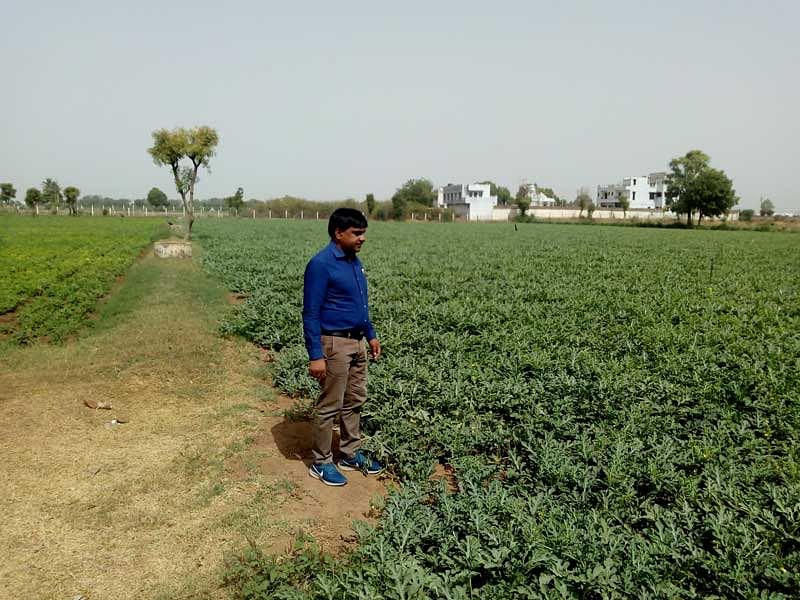
Forty six-year-old Haribhai Patel has a two-bedroom pucca house amidst a cluster of nearly a dozen haphazardly built houses of his extended family, overlooking farms in Medkampa village. With summer heat at its peak, the farmlands surrounding the village look more like a desert, with a few random patches of green.
Haribhai has been growing potato for the past eight years and this season, which ended in March, the produce fetched him a profit of Rs 2 lakh in all. He barely has four acres of land that feeds his family, comprising his wife and two children.
“I have never seen Rs 1 crore. I don’t even know how many zeroes there are in one crore. And, I don’t think I will ever be able to make that much of money. Let these people (PepsiCo India Holdings) come and take me. I have nowhere to go,” he says.
Haribhai’s village is in Vadali taluka, a mundane and dusty town in North Gujarat’s Banaskantha district, where a large number of farmers grow potato. He is among the four potato growers in the district that multinational giant PepsiCo India has sued for Rs 1 crore each for “growing and selling” FC-5 variety of potato, which has been registered with the company under the provisions of the Protection of Plant Varieties and Farmers’ Rights Act, 2001. That means, no one is allowed to grow or sell this variety without the company’s permission. Sitting in a small shop that offers drip irrigation technology to farmers of the region, which has seen water levels disappear deep down the ground, Chabilbhai Patel, another of the four farmers, says, “We have done nothing wrong. Let the company do whatever it wants to.”
Chabilbhai had in 2015-16 worked with PepsiCo on contract basis and grown the FC-3 variety. “I have stopped growing for them ever since. Contract farming is for those who don’t want to take the risk of a volatile market,” he said.
“The condition of the contract farming with Pepsi (most farmers address PepsiCo as Pepsi) is that the farmer will have to buy seeds from the company, and that would cost Rs 1,250-1,300 per 50 kg bag, and the company would buy potatoes for Rs 196 per 20 kg bag,” explained Haribhai.
Chabilbhai said contract farming is not as lucrative as selling in the open market. A farmer can buy seeds for Rs 700-800 per 50 kg for a popular variety. In open market, if the season is good, the farmer can get Rs 220 per 20 kg easily.
These farmers said that PepsiCo buys only potatoes that are above 45 millimetres in length, do not have cracks or greenish texture. On average, 15% of the crop is unsold due to these checks.
“What are we to do with the left-over crop. Traditionally, we have been saving some amount of produce for seeds for the next season, selling the remaining in the market. We even distribute it among relatives and friends. If the company has issues, they should take everything from the field,” said Haribhai.
Some 120 km from Vadali is Deesa town, nicknamed ‘Batakanagari’, or ‘potato city’. Here, Fulchand Kachchawa, 42, and his joint family own over 300 acres of land. On much of it, they have been growing potato. Fulchand also runs several processing units. PepsiCo has sued him and his brother Suresh for Rs 40 lakh.
In his case, the company got the court to appoint a court commissioner to inspect his two cold storage facilities. The high court recently allowed the company’s petition to expand the scope of the probe. Said Fulchand, “We are going to fight. They can come and check whatever they want. The biggest issue is, what is a farmer supposed do with the left-over produce of potato. Can’t he sell it to others if the company does not buy it all?”
PepsiCo India, which has sued at least 10 potato growers in North Gujarat, claims it has developed its particular variety of potato “through extensive research and development” and has used it across the world for several years, including in India since 2009.
The charge against the farmers is that “they are not only infringing the rights of the plaintiff over the said registered variety but have also adopted an identical trademark/commercial name, that is ‘FC-5’, which has been used by the plaintiff.”
The company has alleged that “such conduct of the defendants smacks of dishonesty and mala fide, and makes it evident that the defendants are seeking to commercially exploit the rights and goodwill of the plaintiff associated with the registered variety, that is FL 2027, and the trademark/commercial name thereof, FC-5.”
Farmers’ argument
In a note, Anand Yagni, who represent the four farmers sued for Rs 1 crore each, stated that “PepsiCo has been filing these suits by giving a completely self-serving interpretation to Section 64 of the PPV & FR Act, 2001, which talks about infringement.”
He said that these are small-time farmers with small holdings and had grown a potato crop from farm-saved seed. The farmers could not have been aware of what they had grown and even if they did, it is immaterial because the very statute of 2001 provides them with protection in the form of sub section (iv) of Section 39 which states that notwithstanding anything contained in this Act… “a farmer shall be deemed to be entitled to save, use, sow, re-sow, exchange, share or sell his farm produce, including seed of a variety protected under this Act, in the same manner as he was entitled before the coming into force of this Act, provided that the farmer shall not be entitled to sell branded seed of a variety protected under this Act.”
Late on Thursday, following government intervention, PepsiCo said it will withdraw the cases against the farmers. But the larger issue of multinational companies taking farmers to court over intellectual property and trademark issues remains. Will it come back to haunt the farmers post-elections?